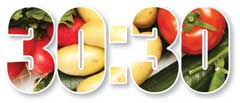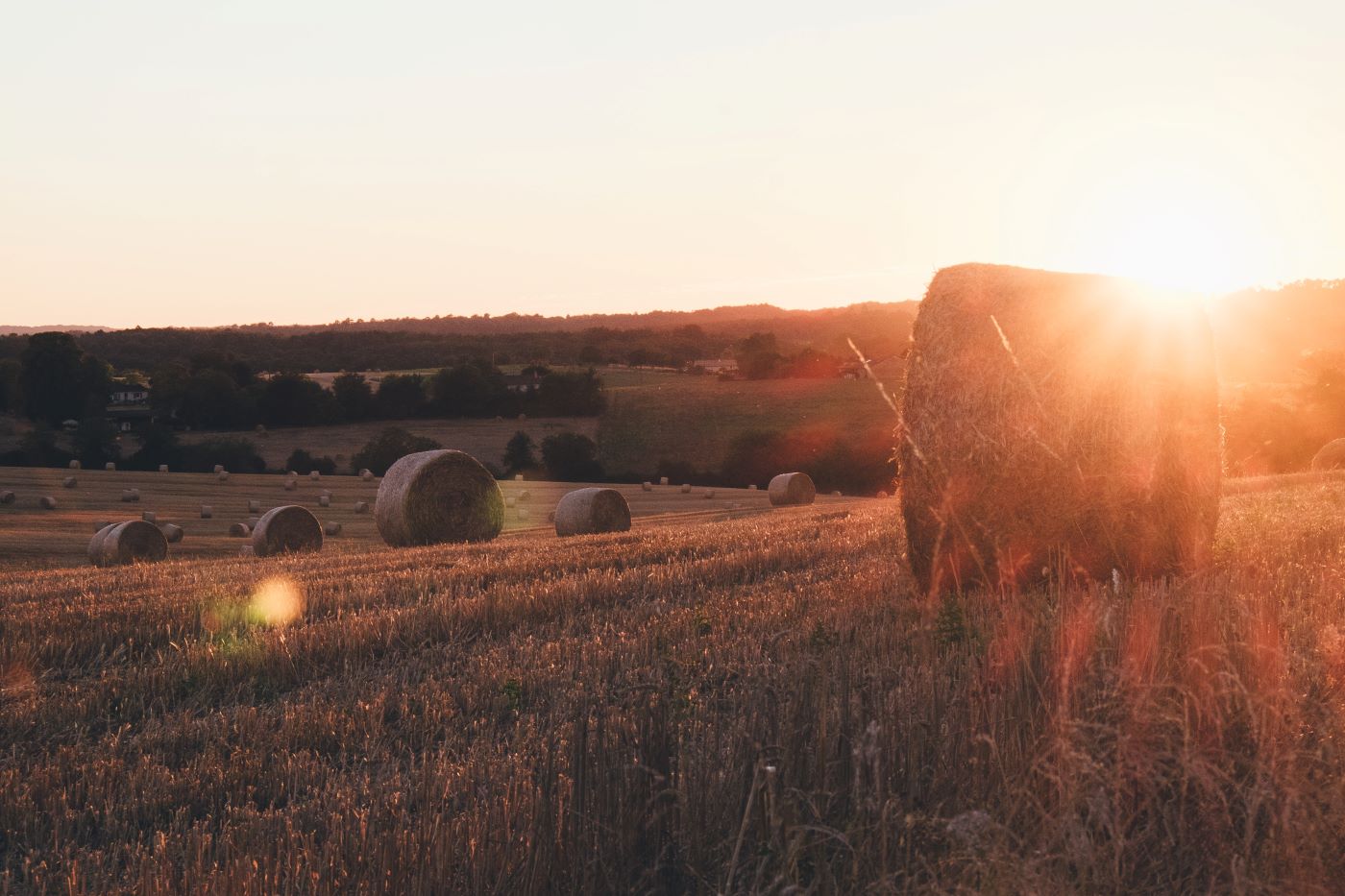There are many good reasons to choose local foods but here is our top 10, based mainly on the views of 1300 shoppers buying local food we spoke to in 12 different towns1.
Why you should buy and eat local food
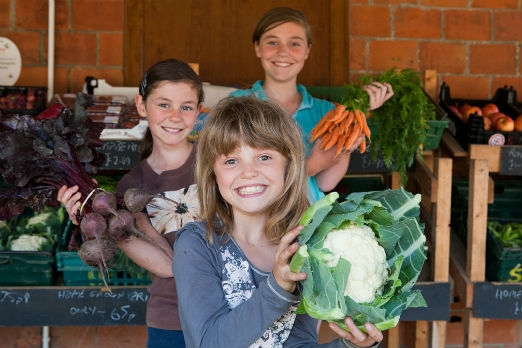 Photo: © Terry Rook
Photo: © Terry Rook
Those shoppers agreed with us that eating local foods can be good for you, your community and your local environment. So we hope we can encourage you to join them in seeking out and buying local food. We don’t think you’ll regret it and it could change the way you shop and eat forever.
Here are 10 reasons to buy and eat local food.
1. You are supporting local farmers and producers
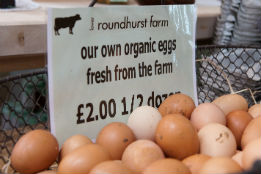 Whether you buy direct or at a local outlet you’re providing a market for local producers where they can get a fair price. Most local food producers are small or ‘micro’ businesses (less than 10 staff) which can’t, at least at the start, distribute more widely. So local food can help existing and new businesses to grow and bring new products to market too.
Whether you buy direct or at a local outlet you’re providing a market for local producers where they can get a fair price. Most local food producers are small or ‘micro’ businesses (less than 10 staff) which can’t, at least at the start, distribute more widely. So local food can help existing and new businesses to grow and bring new products to market too.
2. You get to enjoy great quality and taste
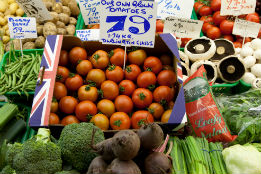 Local food has less far to travel so can be delivered and sold soon after it is picked. The food should be fresh and at its best. Producers also can select varieties for flavour rather than those that travel well or have a long shelf life. These might be heritage varieties or just unusual. One fruit grower we spoke to grows and sells 34 types of plums at the local farmers’ market.
Local food has less far to travel so can be delivered and sold soon after it is picked. The food should be fresh and at its best. Producers also can select varieties for flavour rather than those that travel well or have a long shelf life. These might be heritage varieties or just unusual. One fruit grower we spoke to grows and sells 34 types of plums at the local farmers’ market.
3. You are supporting your local economy
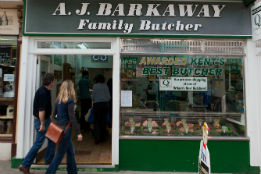 Our own research shows local food can support hundreds of jobs at outlets, even in small towns, and this in turn supports producers in your area (we define local as within 30 miles of where you shop). This means the money you spend automatically circulates again locally and at least 2 to 3 times, boosting prosperity. This can really count in areas where there are no major industries or large employers.
Our own research shows local food can support hundreds of jobs at outlets, even in small towns, and this in turn supports producers in your area (we define local as within 30 miles of where you shop). This means the money you spend automatically circulates again locally and at least 2 to 3 times, boosting prosperity. This can really count in areas where there are no major industries or large employers.
4. You cut the distance your food has to travel
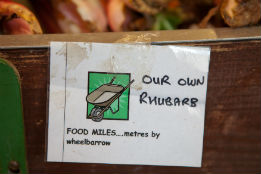 If you don’t buy local food, the food you buy may have been air-freighted, as well as being trucked up and down the country. A quarter of all lorries on the road carry food. Air-freighting of fruit and vegetables is a major contributor to greenhouse gas pollution from our food supply system. Cutting the distance your food has to travel is a simple idea that many shoppers respond to. It is better still to buy seasonally and think about eating less, but better quality (especially grass-fed), meat and dairy to cut your carbon footprint further.
If you don’t buy local food, the food you buy may have been air-freighted, as well as being trucked up and down the country. A quarter of all lorries on the road carry food. Air-freighting of fruit and vegetables is a major contributor to greenhouse gas pollution from our food supply system. Cutting the distance your food has to travel is a simple idea that many shoppers respond to. It is better still to buy seasonally and think about eating less, but better quality (especially grass-fed), meat and dairy to cut your carbon footprint further.
5. You get good value for your money
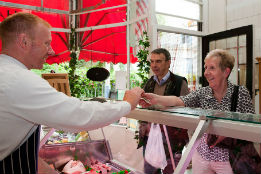 Local food may not always be the cheapest food available but it is certainly affordable for many and it scores well on quality. Shoppers clearly trust it. So it can be great value for money because of the freshness, taste and quality of ingredients. Ultra-processed foods often use cheaper ingredients to bulk out the product, making them appear cheap but feeding you less well. It’s worth comparing prices, too: markets, farm shops and local stores can be as cheap or cheaper than the big chains.
Local food may not always be the cheapest food available but it is certainly affordable for many and it scores well on quality. Shoppers clearly trust it. So it can be great value for money because of the freshness, taste and quality of ingredients. Ultra-processed foods often use cheaper ingredients to bulk out the product, making them appear cheap but feeding you less well. It’s worth comparing prices, too: markets, farm shops and local stores can be as cheap or cheaper than the big chains.
6. You’ll find it easier to eat seasonally
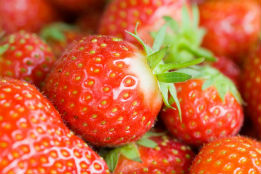 Seasonal food is usually abundant and delivers maximum eating pleasure for the best price. Fruit and veg in season will usually be field grown, which minimises their energy demand and carbon footprint. Local fruit and veg will usually be what is seasonally available in your area and it’s much easier to buy locally to buy seasonal than check seasonality charts: you learn to appreciate the seasons better when you shop locally. Some people also find it more enjoyable to wait for the treat of in-season strawberries or tomatoes than to eat less flavoursome ones for the rest of the year.
Seasonal food is usually abundant and delivers maximum eating pleasure for the best price. Fruit and veg in season will usually be field grown, which minimises their energy demand and carbon footprint. Local fruit and veg will usually be what is seasonally available in your area and it’s much easier to buy locally to buy seasonal than check seasonality charts: you learn to appreciate the seasons better when you shop locally. Some people also find it more enjoyable to wait for the treat of in-season strawberries or tomatoes than to eat less flavoursome ones for the rest of the year.
7. You can cut down on wasted packaging
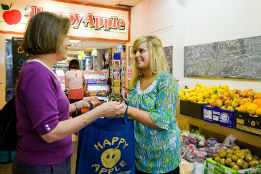 Because food now travels so far, it is packaged to protect it. This does cut food waste but creates millions of tonnes of wrapping waste. Much of it is oil-based plastic that we don’t, or can’t yet, recycle and we all pay to dispose of it. Local food sold through markets, traditional shop and farm shops is often unpackaged or sold in simple bags. Box or bag schemes use reusable cardboard boxes or jute bags, cutting waste even further.
Because food now travels so far, it is packaged to protect it. This does cut food waste but creates millions of tonnes of wrapping waste. Much of it is oil-based plastic that we don’t, or can’t yet, recycle and we all pay to dispose of it. Local food sold through markets, traditional shop and farm shops is often unpackaged or sold in simple bags. Box or bag schemes use reusable cardboard boxes or jute bags, cutting waste even further.
8. You can take better control of what’s in your food and your health
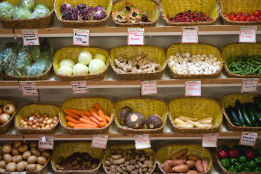 More than one in ten shoppers bought local food for health reasons. We don’t know of research on its health benefits but, logically, local food could help you stick to a healthier diet in several ways. Freshness matters to how nutritious food is, as does overall quality, and local food scores well here. Local food outlets tend to sell more simple fresh or raw ingredients – and that may encourage you to cook more and take better control of what is in your food. Finally, that freshness and flavour can encourage you to hit five-a-day of fruit and veg more easily.
More than one in ten shoppers bought local food for health reasons. We don’t know of research on its health benefits but, logically, local food could help you stick to a healthier diet in several ways. Freshness matters to how nutritious food is, as does overall quality, and local food scores well here. Local food outlets tend to sell more simple fresh or raw ingredients – and that may encourage you to cook more and take better control of what is in your food. Finally, that freshness and flavour can encourage you to hit five-a-day of fruit and veg more easily.
9. You can help protect your local countryside
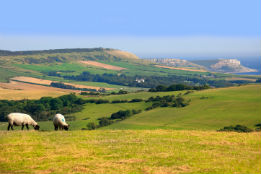 By buying local food you are helping smaller, traditional and mixed farms to survive in an increasingly specialised and intensive farming industry. More of your food pound should go to the farmer or grower so they, in turn, can earn a decent living without needing to grow bigger or to farm more intensively. This keeps the countryside more diverse, especially where it has been shaped by centuries of farming traditions, and so protects the landscape character. Your local food might also be organic, which can help look after the soil and boost local wildlife.
By buying local food you are helping smaller, traditional and mixed farms to survive in an increasingly specialised and intensive farming industry. More of your food pound should go to the farmer or grower so they, in turn, can earn a decent living without needing to grow bigger or to farm more intensively. This keeps the countryside more diverse, especially where it has been shaped by centuries of farming traditions, and so protects the landscape character. Your local food might also be organic, which can help look after the soil and boost local wildlife.
10. You can build new connections with your community
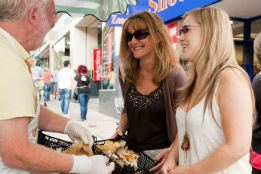 Buying local food from a range of outlets is one way to get to understand where your food comes from, the people who produce it and also to know your area better. The ‘human scale’ of local food shopping means you can find out more about the food, give people feedback and feel you are making a difference to not only their lives and local prosperity but also the quality of your town and the countryside around it.
Buying local food from a range of outlets is one way to get to understand where your food comes from, the people who produce it and also to know your area better. The ‘human scale’ of local food shopping means you can find out more about the food, give people feedback and feel you are making a difference to not only their lives and local prosperity but also the quality of your town and the countryside around it.
1 CPRE survey of 1300 shoppers in 12 locations – see page 50 of From field to fork: the value of England’s local food webs
Find out more
Discover how and where to find and buy local food
Read more about our work on local food
Get involved
More featured articles
-
We're making some changes2019-08-01Calling all graduates...2019-06-24Women countryside campaigners: the 1920s2019-01-31The landscapes they left behind2018-11-09A deposit return system for England2018-03-28Emma Bridgewater on CPRE's big ideas2017-07-24My England: the photographer’s vision2017-04-19Leicestershire: A Heritage at Risk2017-01-05And that’s a wrap!2016-12-23What next for rural England?2016-12-16Finding inspiration in the Green Belt2016-12-16Protecting our literary landscapes2016-12-07Celebrating 90 years of CPRE2016-12-07Web survey book winners announced2016-10-28Why we should buy locally produced food2016-09-27
